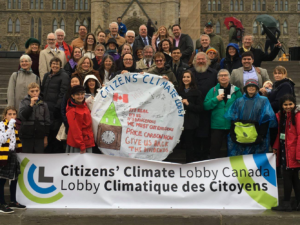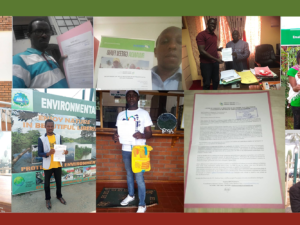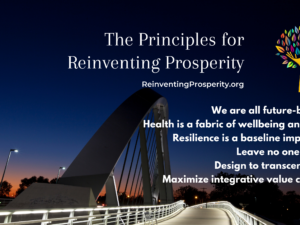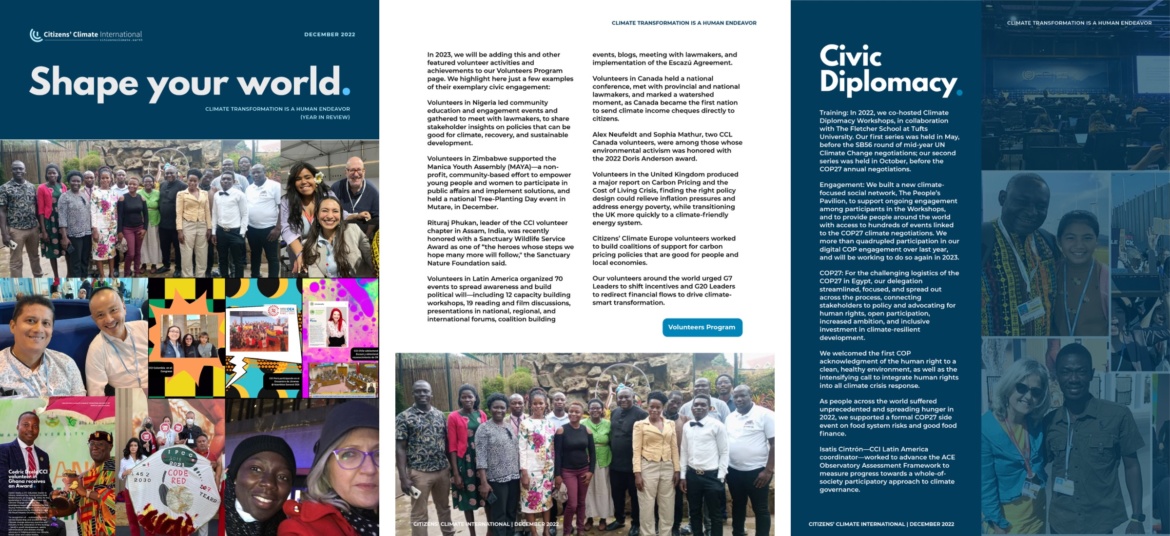
2022 was a year of tectonic shifts. In some ways, the calendar of this year qualifies as what UN Secretary-General Guterres called “an atlas of human suffering”—with climate, conflict, COVID, and major food system disruptions subjecting vulnerable populations to unthinkable risk and harm. 2022 has also revealed, however, that authoritarian systems are not as accepted or ascendant as many had come to believe. 2022 showed us that accountability, resilience, the protection of innocents, and legitimacy are inextricably linked. The future can and must be climate-smart, and that will require openness, participation, and inclusion.
Our Volunteers
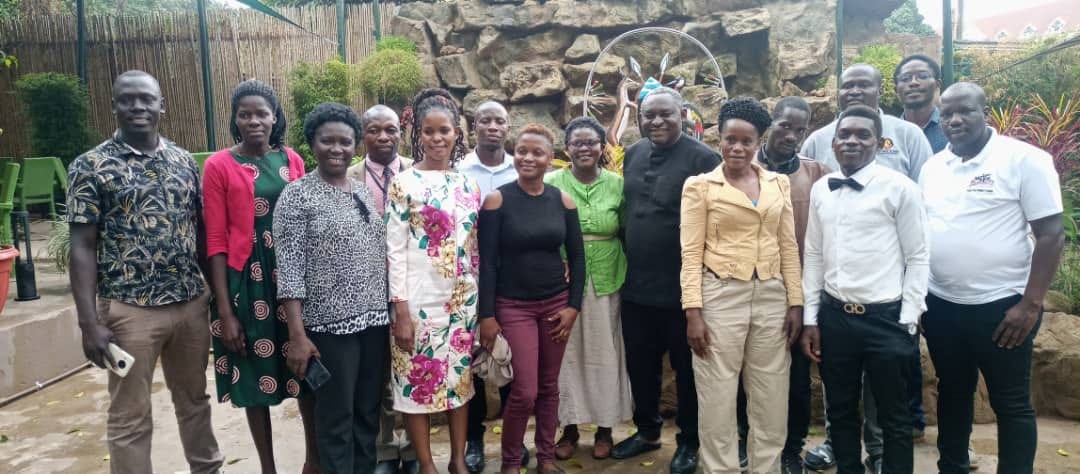
CCI Field Development Lead and Africa Coordinator Mike Terungwa with CCI Uganda volunteers, after a day of Climate Advocate Training.
In 2022, CCI provided education and empowerment to volunteer chapters in 76 countries. Our volunteers welcomed new members, trained and supported each other, and worked on Five Levers for building political will: chapter development; meeting with public officials; media relations; community engagement; connecting with trusted leaders. To support their work:
- In January 2022, we started a series of monthly check-in calls for volunteer leaders, on the 2nd Tuesday of every month.
- We held our first global Month of Action and created a new Volunteer Activity reporting form, to gather reports from the field.
- We also established this CCI Newsletter, including the monthly ‘Shape your world’ editions, as a detailed and trusted information resource for people inside our organization and our wider community of friends and allies.
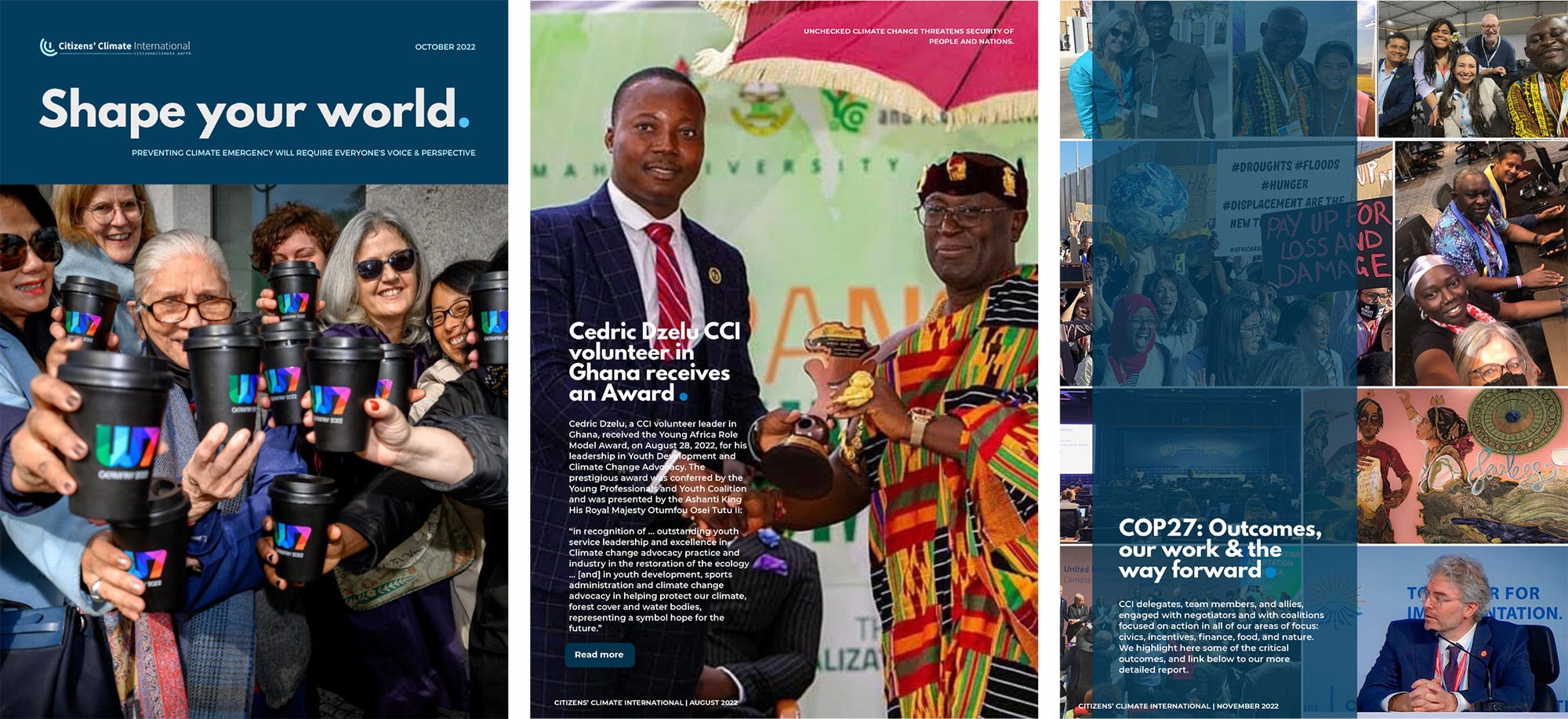
In 2023, we will be adding this and other featured volunteer activities and achievements to our Volunteers Program page. We highlight here just a few examples of their exemplary civic engagement:
- Volunteers in Nigeria led community education and engagement events and gathered to meet with lawmakers, to share stakeholder insights on policies that can be good for climate, recovery, and sustainable development.
- Volunteers in Zimbabwe supported the Manica Youth Assembly (MAYA)—a non-profit, community-based effort to empower young people and women to participate in public affairs and implement solutions, and held a national Tree-Planting Day event in Mutare, in December.
- Rituraj Phukan, leader of the CCI volunteer chapter in Assam, India, was recently honored with a Sanctuary Wildlife Service Award as one of “the heroes whose steps we hope many more will follow,” the Sanctuary Nature Foundation said.
- Volunteers in Latin America organized 70 events to spread awareness and build political will—including 12 capacity building workshops, 19 reading and film discussions, presentations in national, regional, and international forums, coalition building events, blogs, meeting with lawmakers, and implementation of the Escazú Agreement.
- Volunteers in Canada held a national conference, met with provincial and national lawmakers, and marked a watershed moment, as Canada became the first nation to send climate income cheques directly to citizens.
- Alex Neufeldt and Sophia Mathur, two CCL Canada volunteers, were among those whose environmental activism was honored with the 2022 Doris Anderson award.
- Volunteers in the United Kingdom produced a major report on Carbon Pricing and the Cost of Living Crisis, finding the right policy design could relieve inflation pressures and address energy poverty, while transitioning the UK more quickly to a climate-friendly energy system.
- Citizens’ Climate Europe volunteers worked to build coalitions of support for carbon pricing policies that are good for people and local economies.
Civic Diplomacy
Training: In 2022, we co-hosted Climate Diplomacy Workshops, in collaboration with The Fletcher School at Tufts University. Our first series was held in May, before the SB56 round of mid-year UN Climate Change negotiations; our second series was held in October, before the COP27 annual negotiations.
Engagement: We built a new climate-focused social network, The People’s Pavilion, to support ongoing engagement among participants in the Workshops, and to provide people around the world with access to hundreds of events linked to the COP27 climate negotiations. We more than quadrupled participation in our digital COP engagement over last year, and will be working to do so again in 2023.
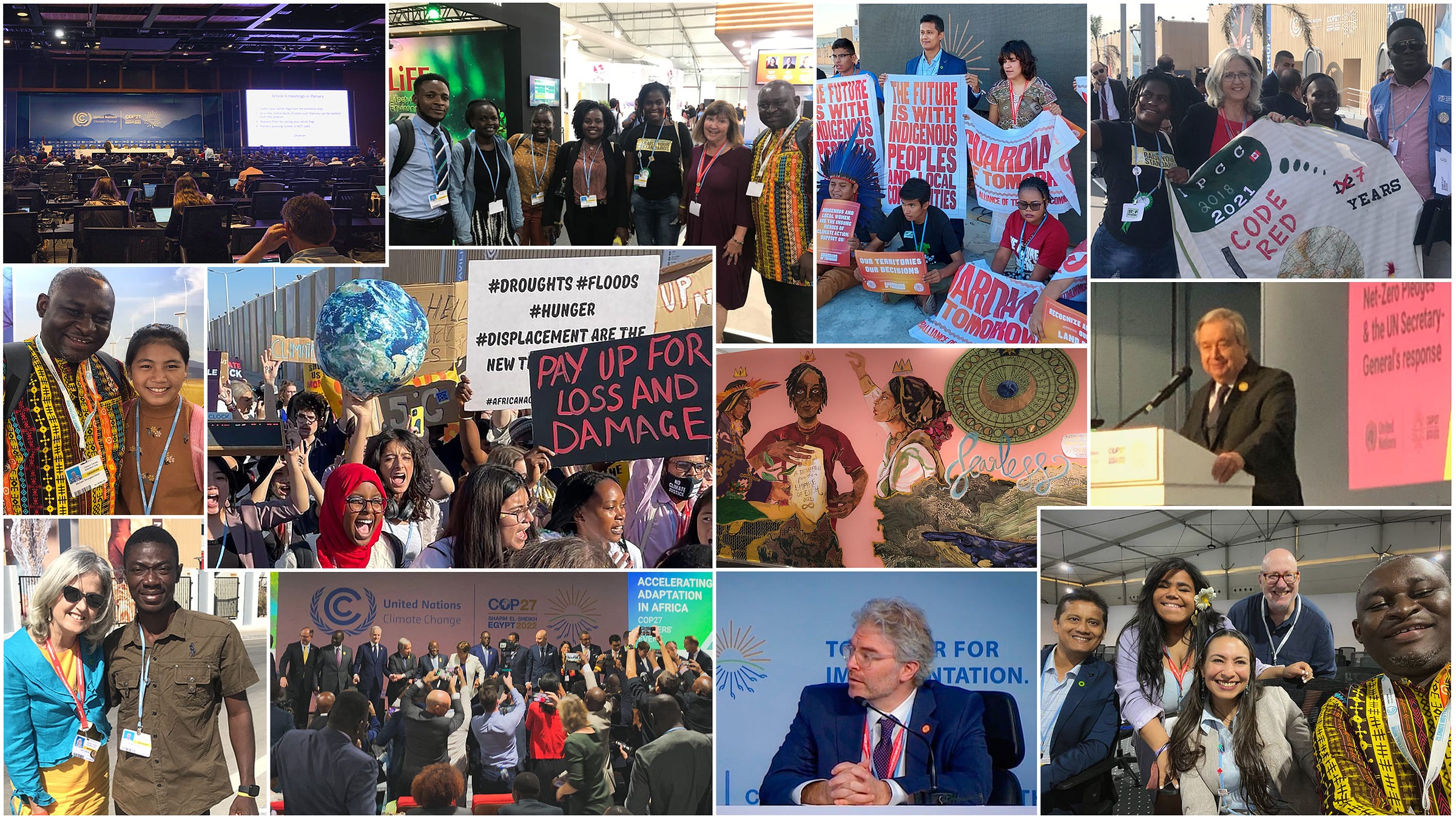
COP27: For the challenging logistics of the COP27 in Egypt, our delegation streamlined, focused, and spread out across the process, connecting stakeholders to policy and advocating for human rights, open participation, increased ambition, and inclusive investment in climate-resilient development.
- We welcomed the first COP acknowledgment of the human right to a clean, healthy environment, as well as the intensifying call to integrate human rights into all climate crisis response.
- As people across the world suffered unprecedented and spreading hunger in 2022, we supported a formal COP27 side event on food system risks and good food finance.
- Isatis Cintrón—CCI Latin America coordinator—worked to advance the ACE Observatory Assessment Frameworkto measure progress towards a whole-of-society participatory approach to climate governance.
We highlight some of our COP27 reports and briefing notes below.
- CCI COP27 Closing Report: Our activities & the formal outcomes
- Loss and Damage: Invest to overcome vulnerability
- Non-market approaches: Bold cooperation to mainstream climate resilient development
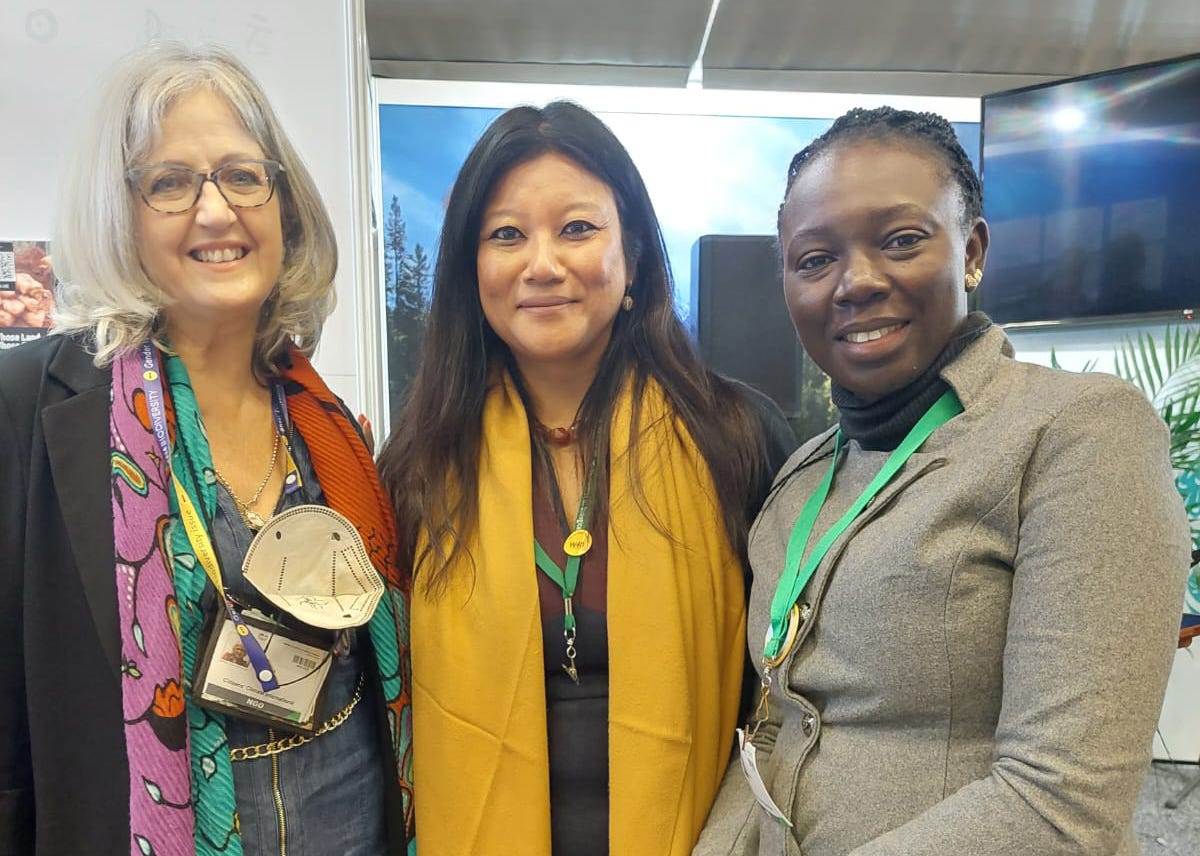
Cathy Orlando, Program Director for Citizens’ Climate International, with Mrinalini Rai, director of Women 4 Biodiversity and UN CBD Women’s Caucus co-coordinator, and Gloria Bulus, Citizens’ Climate International leader from Kaduna, Nigeria, at the CBD COP15 in Montreal.
Biodiversity: CCI sent a delegation to the Convention on Biological Diversity (CBD) negotiations for the first time this year.
- Our core message was: We are nature; the health and resilience of biodiverse ecosystems is critical to sustaining human health and wellbeing.
- The Montreal conference resulted in adoption of a new Global Biodiversity Framework, centering on a goal of protecting 30% of land and ocean by 2030, while mobilizing hundreds of billions of dollars in an unprecedented effort to restore and safeguard biodiversity.
- That plan needs to turn into action.
G7: In 2022, CCI also supported major progress toward honoring and uplifting the role of women as stakeholders and as leaders, through networks connected to the G7 process. Cathy Orlando served as a W7 advisor, and CCI held a Talanoa Dialogue for Women in All their Diversity, to provide stakeholder insights to the G7 and other international processes.
G20: CCI volunteers also coordinated to send more than 1,100 personal letters from 71 countries to leaders of the G20 countries, urging them to “follow the money” and shift finance flows to climate-smart, sustainable and equitable priorities.
Carbon Pricing

Carbon pricing is not only about energy. It is about limiting the climate destruction of everyday goods that move across the world.
2022 saw expansion of the reach of carbon pricing policies supported by CCI and our network of citizen volunteers. Four key news items highlight the progress made:
- In July, volunteers across Canada celebrated their country becoming the first in the world to issue climate income cheques directly to citizens—an outcome they had worked toward since 2010.
- In October, Austria launched its Klimabonus program, paying rebates from carbon tax revenues to households. CCEU volunteers have met with Austrian officials to learn about Klimabonus and share insights with others.
- The European Union moved forward with its Carbon Border Adjustment Mechanism (CBAM), which will incentivize trading partners to price carbon pollution.
- Progress on non-market approaches under Article 6.8 of the Paris Agreement creates opportunity for more nations to join carbon pricing clubs.
In 2022, CCI began tracking policies and mechanisms related to implementation of climate income systems. In 2023, CCI will be using its position on the Carbon Pricing Leadership Advisory Group to advance and diversify consideration of climate income policies and non-market approaches.
- Adapting the PARIS Principles for fair, effective, and efficient carbon pricing to enhance innovation and implementation around non-market climate cooperation will provide a foundation for this work.
- The Citizens’ Climate UK report on Carbon Pricing and Cost-of-Living will serve as a case study for the kind of policy analysis that should be undertaken to ensure benefits for local communities, fiscal stability, and climate resilience.
Resilience Intelligence
Our Resilience Intelligence program grew out of diplomatic roundtables that consistently brought calls for connecting finance to drivers of hidden cost and co-benefits that build resilience. In 2022, our Resilience Intel reports provided important insights on non-market climate cooperation, food security, early warning systems, and climate-resilient development.

We highlight some of the more impactful Resilience Intel briefs of 2022 here:
- Capital to Communities—The 2022 Reinventing Prosperity Report
- International finance reform is gaining momentum
- Creating fiscal space for climate action
- Food security is a bigger problem than you think
What’s next?
Non-Market Approaches planning meetings: On Monday, January 9, 2023, we will hold the next monthly meeting on Non-market approaches under Article 6.8 of the Paris Agreement. These meetings review progress on NMA cooperation in the UN process and emerging national policies and local benefits. Register here.
CCI Global Check-in Calls: CCI volunteer leaders across the world will gather circa the 2nd Tuesday of every month for global check-ins. Chapter leaders can find this information in their email and are welcome to invite chapter members.
CCU online training on COP27 outcomes: On Thursday, January 12, 2023, the Citizens’ Climate University webinar series will feature leaders from the CCI team sharing insights about the outcomes of COP27 and the work ahead. Citizens’ Climate volunteers and staff can RSVP through CCL Community.
CCI Informational Sessions: On Wednesday, January 18, 2023, we will hold the next round of CCI Informational Sessions. At three times, to accommodate participants around the world, we will review CCI mission activities and how you can help create an equitable and resilient world. Register here.
Consultation on a Livable Future: On Tuesday, January 24, 2023, we will hold the first global hybrid event to feed stakeholders’ insights into a Global Consultation on Priorities for a Livable Future. The Consultation is an opportunity to share your ideas for transformation of policy at local, national, and international levels. Learn more.





